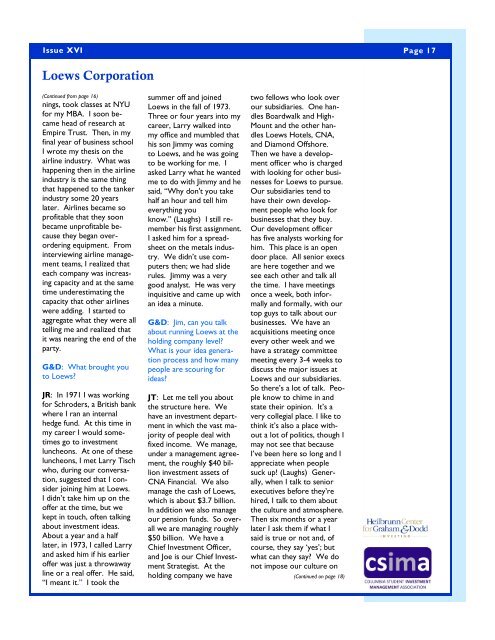Graham & Doddsville - Columbia Business School
Graham & Doddsville - Columbia Business School
Graham & Doddsville - Columbia Business School
You also want an ePaper? Increase the reach of your titles
YUMPU automatically turns print PDFs into web optimized ePapers that Google loves.
Issue Volume XVI I, Issue 2 Page 17<br />
Loews Corporation<br />
(Continued from page 16)<br />
nings, took classes at NYU<br />
for my MBA. I soon became<br />
head of research at<br />
Empire Trust. Then, in my<br />
final year of business school<br />
I wrote my thesis on the<br />
airline industry. What was<br />
happening then in the airline<br />
industry is the same thing<br />
that happened to the tanker<br />
industry some 20 years<br />
later. Airlines became so<br />
profitable that they soon<br />
became unprofitable because<br />
they began overordering<br />
equipment. From<br />
interviewing airline management<br />
teams, I realized that<br />
each company was increasing<br />
capacity and at the same<br />
time underestimating the<br />
capacity that other airlines<br />
were adding. I started to<br />
aggregate what they were all<br />
telling me and realized that<br />
it was nearing the end of the<br />
party.<br />
G&D: What brought you<br />
to Loews?<br />
JR: In 1971 I was working<br />
for Schroders, a British bank<br />
where I ran an internal<br />
hedge fund. At this time in<br />
my career I would sometimes<br />
go to investment<br />
luncheons. At one of these<br />
luncheons, I met Larry Tisch<br />
who, during our conversation,<br />
suggested that I consider<br />
joining him at Loews.<br />
I didn’t take him up on the<br />
offer at the time, but we<br />
kept in touch, often talking<br />
about investment ideas.<br />
About a year and a half<br />
later, in 1973, I called Larry<br />
and asked him if his earlier<br />
offer was just a throwaway<br />
line or a real offer. He said,<br />
“I meant it.” I took the<br />
summer off and joined<br />
Loews in the fall of 1973.<br />
Three or four years into my<br />
career, Larry walked into<br />
my office and mumbled that<br />
his son Jimmy was coming<br />
to Loews, and he was going<br />
to be working for me. I<br />
asked Larry what he wanted<br />
me to do with Jimmy and he<br />
said, “Why don't you take<br />
half an hour and tell him<br />
everything you<br />
know.” (Laughs) I still remember<br />
his first assignment.<br />
I asked him for a spreadsheet<br />
on the metals industry.<br />
We didn’t use computers<br />
then; we had slide<br />
rules. Jimmy was a very<br />
good analyst. He was very<br />
inquisitive and came up with<br />
an idea a minute.<br />
G&D: Jim, can you talk<br />
about running Loews at the<br />
holding company level?<br />
What is your idea generation<br />
process and how many<br />
people are scouring for<br />
ideas?<br />
JT: Let me tell you about<br />
the structure here. We<br />
have an investment department<br />
in which the vast majority<br />
of people deal with<br />
fixed income. We manage,<br />
under a management agreement,<br />
the roughly $40 billion<br />
investment assets of<br />
CNA Financial. We also<br />
manage the cash of Loews,<br />
which is about $3.7 billion.<br />
In addition we also manage<br />
our pension funds. So overall<br />
we are managing roughly<br />
$50 billion. We have a<br />
Chief Investment Officer,<br />
and Joe is our Chief Investment<br />
Strategist. At the<br />
holding company we have<br />
two fellows who look over<br />
our subsidiaries. One handles<br />
Boardwalk and High-<br />
Mount and the other handles<br />
Loews Hotels, CNA,<br />
and Diamond Offshore.<br />
Then we have a development<br />
officer who is charged<br />
with looking for other businesses<br />
for Loews to pursue.<br />
Our subsidiaries tend to<br />
have their own development<br />
people who look for<br />
businesses that they buy.<br />
Our development officer<br />
has five analysts working for<br />
him. This place is an open<br />
door place. All senior execs<br />
are here together and we<br />
see each other and talk all<br />
the time. I have meetings<br />
once a week, both informally<br />
and formally, with our<br />
top guys to talk about our<br />
businesses. We have an<br />
acquisitions meeting once<br />
every other week and we<br />
have a strategy committee<br />
meeting every 3-4 weeks to<br />
discuss the major issues at<br />
Loews and our subsidiaries.<br />
So there’s a lot of talk. People<br />
know to chime in and<br />
state their opinion. It’s a<br />
very collegial place. I like to<br />
think it’s also a place without<br />
a lot of politics, though I<br />
may not see that because<br />
I’ve been here so long and I<br />
appreciate when people<br />
suck up! (Laughs) Generally,<br />
when I talk to senior<br />
executives before they’re<br />
hired, I talk to them about<br />
the culture and atmosphere.<br />
Then six months or a year<br />
later I ask them if what I<br />
said is true or not and, of<br />
course, they say ‘yes’; but<br />
what can they say? We do<br />
not impose our culture on<br />
(Continued on page 18)



